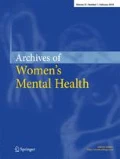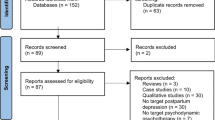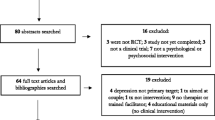Abstract
Interpersonal psychotherapy (IPT) is a dynamically informed and present-focused psychotherapy originally conceived for patients with unipolar depression and subsequently modified for other disorders, including postpartum depression (PPD). The aim of this paper is to review the evidence on the efficacy of IPT for PPD. We conducted a systematic review of studies published between 1995 and April 2013 assessing the efficacy of IPT for PPD using PubMed and PsycINFO. We included the following: (i) articles that presented a combination of at least two of the established terms in the abstract, namely, interpersonal [all fields] and (“psychotherapy” [MeSH terms] or psychotherapy [all fields]) and (perinatal [all fields] or postpartum [all fields]) and (“depressive disorder” [MeSH terms] or (“depressive” [all fields] and “disorder” [all fields]) or depressive disorder [all fields] or “depression” [all fields] or depression [MeSH terms]); (ii) manuscripts in English; (iii) original articles; and (iv) prospective or retrospective observational studies (analytical or descriptive), experimental, or quasi-experimental. Exclusion criteria were as follows: (i) other study designs, such as case reports, case series, and reviews; (ii) non-original studies including editorials, book reviews, and letters to the editor; and (iii) studies not specifically designed and focused on IPT. We identified 11 clinical primary trials assessing the efficacy of IPT for PPD, including 3 trials with group interventions (G-IPT) and one that required the presence of the partner (PA-IPT). We also identified six studies interpersonal-psychotherapy-oriented preventive interventions for use in pregnancy. IPT studies showed overall clinical improvement in the most commonly used depression measures in postpartum depressed women (EPDS, HDRS, BDI) and often-full recovery in several cases of treated patients. Evidence from clinical trials indicates that, when administered in monotherapy (or in combination with antidepressants), IPT may shorten the time to recovery from PPD and prolong the time spent in clinical remission.

Similar content being viewed by others
References
Abreu A, Stuart S (2005) Medical treatments for postpartum depression. Psychiatr Ann 35:568–575
American Psychiatric Association (1987) Diagnostic and statistical manual of mental disorders, 3rd edn. American Psychiatric Association, Washington
American Psychiatric Association (2000) Diagnostic and statistical manual of mental disorders, 4th edn. American Psychiatric Association, Washington
Appleby L, Warner R, Whitton A, Faragher B (1997) A controlled study of fluoxetine and cognitive-behavioural counselling in the treatment of postnatal depression. BMJ 314:932–936
Beck AT, Ward CH, Mendelson M, Mock J, Erbaugh J (1961) An inventory for measuring depression. Arch Gen Psychiatry 4:561–571
Boath E, Henshaw C (2001) The treatment of postnatal depression: a comprehensive literature review. J Reprod Infant Psychol 19:215–248
Bowlby J (1969) Attachment. Basic Books, New York
Brandon AR, Ceccotti N, Hynan LS, Shivakumar G, Johnson N, Jarrett RB, Proof of concept (2012) Partner-assisted interpersonal psychotherapy for perinatal depression. Arch Womens Ment Health 15:469–480
Burt VK, Suri R, Altshuler L, Stowe Z, Hendrick VC, Muntean E (2001) The use of psychotropic medications during breast-feeding. Am J Psychiatry 158:1001–1009
Clark R, Tluczek A, Wenzel A (2003) Psychotherapy for postpartum depression: a preliminary report. Am J Orthopsychiatry 73:441–454
Cohen LS, Viguera AC, Bouffard SM, Nonacs RM, Morabito C, Collins MH, Ablon JS (2001) Venlafaxine in the treatment of postpartum depression. J Clin Psychiatry 62:592–596
Cooper PJ, Murray L (1995) Course and recurrence of postnatal depression. Evidence for the specificity of the diagnostic concept. Br J Psychiatry 166:191–195
Cox JL, Connor YM, Henderson I, McGuire RJ, Kendell RE (1983) Prospective study of the psychiatric disorders of childbirth by self-report questionnaire. J Affect Disord 5:1–7
Cox JL, Holden JM, Sagovsky R (1987) Detection of postnatal depression: development of the Edinburgh Postnatal Depression Scale. Br J Psychiatry 150:782–786
Cuijpers P, Brännmark JG, van Straten A (2008) Psychological treatment of postpartum depression: a meta-analysis. J Clin Psychol 64:103–118
Dennis CL, Stewart DE (2004) Treatment of postpartum depression, part 1: a critical review of biological interventions. J Clin Psychiatry 65:1242–1251
Dietz PM, Williams SB, Callaghan WM, Bachman DJ, Whitlock EP, Hornbrook MC (2007) Clinically identified maternal depression before, during, and after pregnancies ending in live births. Am J Psychiatry 164:1515–1520
Field T (1995) Infants of depressed mothers. Infect Behav Dev 18:1–13
First MB, Spitzer RL, Gibbon M, Williams JBW (1997) Structured clinical interview for DSM-IV axis I disorders: research version, non-patient edition. New York State Psychiatric, New York
Gao LL, Chan SW, Li X, Chen S, Hao Y (2010) Evaluation of an interpersonal-psychotherapy-oriented childbirth education programme for Chinese first-time childbearing women: a randomised controlled trial. Int J Nurs Stud 47:1208–1216
Gao LL, Chan SW, Sun K (2012) Effects of an interpersonal-psychotherapy-oriented childbirth education programme for Chinese first-time childbearing women at 3-month follow up: randomised controlled trial. Int J Nurs Stud 49:274–281
Gaynes BN, Gavin N, Meltzer-Brody S, Lohr KN, Swinson T, Gartlehner G, Brody S, Miller WC (2005) Perinatal depression: prevalence, screening accuracy, and screening outcomes. Evid Rep Technol Assess 119:1–8
Goodman JH (2009) Women’s attitudes, preferences, and perceived barriers to treatment for perinatal depression. Birth 36:60–69
Goodman JH, Santangelo G (2011) Group treatment for postpartum depression: a systematic review. Arch Womens Ment Health 14:277–293
Goodman JH, Tyer-Viola L (2010) Detection, treatment, and referral of perinatal depression and anxiety by obstetrical providers. J Womens Health 19:477–490
Grace SL, Evindar A, Stewart DE (2003) The effect of postpartum depression on child cognitive development and behavior: a review and critical analysis of the literature. Arch Womens Ment Health 6:263–274
Grote NK, Zuckoff A, Swartz H, Bledsoe SE, Geibel S (2007) Engaging women who are depressed and economically disadvantaged in mental health treatment. Soc Work 52:295–308
Grote NK, Swartz HA, Zuckoff A (2008) Enhancing interpersonal psychotherapy for mothers and expectant mothers on low incomes: adaptations and additions. J Contemp Psychother 38:23–33
Grote NK, Swartz HA, Geibel SL, Zuckoff A, Houck PR, Frank E (2009) A randomized controlled trial of culturally relevant, brief interpersonal psychotherapy for perinatal depression. Psychiatr Serv 60:313–321
Hamilton MA (1967) Development of a rating scale for primary depressive illness. Br J Soc Clin Psychol 6:278–296
Horowitz JA, Cousins A (2006) Postpartum depression treatment rates for at-risk women. Nurs Res 55:s23–s27
Johnson SM (2004) The practice of emotionally focused couple therapy: creating connection, 2nd edn. Brunner-Routledge, New York
Keller MB, Lavori PW, Friedman B, Nielsen E, Endicott J, McDonald-Scott P, Andreasen NC (1987) The longitudinal interval follow-up evaluation. A comprehensive method for assessing outcome in prospective longitudinal studies. Arch Gen Psychiatry 44:540–548
Klerman GL, Weissman MM, Rounsaville BJ, Chevron ES (1984) Interpersonal psychotherapy of depression. Basic Books, New York
Klier CM, Muzik M, Rosenblum KL, Lenz G (2001) Interpersonal psychotherapy adapted for the group setting in the treatment of postpartum depression. J Psychother Pract Res 10:124–131
Kozinszky Z, Dudas RB, Devosa I, Csatordai S, Tóth E, Szabó D, Sikovanyecz J, Barabás K, Pál A (2012) Can a brief antepartum preventive group intervention help reduce postpartum depressive symptomatology? Psychother Psychosom 81:98–107
Marcus SM, Flynn HA, Blow FC, Barry KL (2003) Depressive symptoms among pregnant women screened in obstetrics settings. J Womens Health 12:373–380
Meltzer-Brody S (2011) New insights into perinatal depression: pathogenesis and treatment during pregnancy and postpartum. Dialogues Clin Neurosci 13:89–100
Miklowitz DJ, Hooley JM (1998) Developing family psychoeducational treatments for patients with bipolar and other severe psychiatric disorders. A pathway from basic research to clinical trials. J Marital Fam Ther 24:419–435
Milgrom J, Negri LM, Gemmill AW, McNeil M, Martin PR (2005) A randomized controlled trial of psychological interventions for postnatal depression. Br J Clin Psychol 44:529–542
Miller LJ (2002) Postpartum depression. JAMA 287:762–765
Millon T, Davis R, Millon C (1997) Millon clinical multiaxial inventory-III (MCMI-III), 2nd edn. NCS Pearson Inc, Minneapolis
Misri S, Kendrick K (2007) Treatment of perinatal mood and anxiety disorders: a review. Can J Psychiatry 52:489–498
Misri S, Kostaras X (2002) Benefits and risks to mother and infant of drug treatment for postnatal depression. Drug Saf 25:903–911
Mulcahy R, Reay RE, Wilkinson RB, Owen C (2010) A randomised control trial for the effectiveness of group interpersonal psychotherapy for postnatal depression. Arch Womens Ment Health 13:125–139
Nylen KJ, O’Hara MW, Brock R, Moel J, Gorman L, Stuart S (2010) Predictors of the longitudinal course of postpartum depression following interpersonal psychotherapy. J Consult Clin Psychol 78:757–763
O’Hara MW (1994) Postpartum depression: causes and consequences. Springer, New York
O’Hara M, Swain A (1996) Rates and risk of postpartum depression: a meta-analysis. Int Rev Psychiatry 8:37–54
O’Hara MW, Hoffman JG, Phillips LHC, Wright EJ (1992) Adjustment in childbearing women: the postpartum adjustment questionnaire. Psychol Assess 4:160–169
O’Hara MW, Stuart S, Gorman LL, Wenzel A (2000) Efficacy of interpersonal psychotherapy for postpartum depression. Arch Gen Psychiatry 57:1039–1045
Pearlstein TB, Zlotnick C, Battle CL, Stuart S, O’Hara MW, Price AB, Grause MA, Howard M (2006) Patient choice of treatment for postpartum depression: a pilot study. Arch Womens Ment Health 9:303–308
Radloff LS (1977) The CES-D: a self-report depression scale for research in the general population. Appl Psychol Meas 1:385–401
Reay R, Fisher Y, Robertson M, Adams E, Owen C, Kumar R (2006) Group interpersonal psychotherapy for postnatal depression: a pilot study. Arch Womens Ment Health 9:31–39
Reay RE, Owen C, Shadbolt B, Raphael B, Mulcahy R, Wilkinson RB (2012) Trajectories of long-term outcomes for postnatally depressed mothers treated with group interpersonal psychotherapy. Arch Womens Ment Health 15:217–228
Ross LE, Sellers EM, Gilbert Evans SE, Romach MK (2004) Mood changes during pregnancy and the postpartum period: development of a biopsychosocial model. Acta Psychiatr Scand 109:457–466
Shapiro DA, Rees A, Barkham M, Hardy G, Reynolds S, Startup M (1995) Effects of treatment duration and severity of depression on the maintenance of gains after cognitive-behavioral and psychodynamic-interpersonal psychotherapy. J Consult Clin Psychol 63:378–387
Sit DKY, Wisner KL (2005) Decision making for postpartum depression treatment. Psychiatr Ann 35:577–585
Sockol LE, Epperson CN, Barber JP (2011) A meta-analysis of treatments for perinatal depression. Clin Psychol Rev 31:839–849
Spanier GB (1976) Measuring dyadic adjustment: new scales for assessing the quality of marriage and similar dyads. J Marriage Fam 38:15–28
Stuart S (2006) Interpersonal psychotherapy: a guide to the basics. Psychiatr Ann 36:542–549
Stuart S (2012) Interpersonal psychotherapy for postpartum depression. Clin Psychol Psychother 19:134–140
Stuart S, O’Hara MW (1995) Treatment of postpartum depression with interpersonal psychotherapy. Arch Gen Psychiatry 52:75–76
Stuart S, Robertson M (2003) Interpersonal psychotherapy: a clinician’s guide. Edward Arnold Ltd, London
Sullivan HS (1953) The interpersonal theory of psychiatry. Norton, New York
Tronick E, Reck C (2009) Infants of depressed mothers. Harv Rev Psychiatry 17:147–156
Weinberg MK, Tronick EZ, Beeghly M, Olson KL, Kernan H, Riley JM (2001) Subsyndromal depressive symptoms and major depression in postpartum women. Am J Orthopsychiatry 71:87–97
Weissman MM, Bothwell S (1976) Assessment of social adjustment by patient self-report. Arch Gen Psychiatry 33:1111–1115
Weissman AM, Levy BT, Hartz AJ, Bentler S, Donohue M, Ellingrod VL, Wisner KL (2004) Pooled analysis of antidepressant levels in lactating mothers, breast milk, and nursing infants. Am J Psychiatry 161:1066–1078
Whitton A, Appleby L, Warner R (1996a) Maternal thinking and the treatment of postnatal depression. Int J Psychiatry 8:73–78
Whitton A, Warner R, Appleby L (1996b) The pathway to care in post-natal depression: women’s attitudes to post-natal depression and its treatment. Br J Gen Pract 46:427–428
Wisner KL, Hanusa BH, Perel JM, Peindl KS, Piontek CM, Sit DKY, Findling RL, Moses-Kolko EL (2006) Postpartum depression: a randomized trial of sertraline versus nortriptyline. J Clin Psychopharmacol 26:353–360
Yonkers KA, Lin H, Howell HB, Heath AC, Cohen LS (2008) Pharmacologic treatment of postpartum women with new-onset major depressive disorder: a randomized controlled trial with paroxetine. J Clin Psychiatry 69:659–665
Zimmerman M, Coryell W (1987) The inventory to diagnose depression (IDD): a self-report scale to diagnose major depressive disorders. J Consult Clin Psychol 55:55–59
Zlotnick C, Johnson SL, Miller IW, Pearlstein T, Howard M (2001) Postpartum depression in women receiving public assistance: pilot study of an interpersonal-therapy-oriented group intervention. Am J Psychiatry 158:638–640
Acknowledgments
The authors gratefully acknowledge the assistance of Dr. Giulia Gray of the University of Pisa, Italy, for the English revision.
Conflict of interests
None
Author information
Authors and Affiliations
Corresponding author
Rights and permissions
About this article
Cite this article
Miniati, M., Callari, A., Calugi, S. et al. Interpersonal psychotherapy for postpartum depression: a systematic review. Arch Womens Ment Health 17, 257–268 (2014). https://doi.org/10.1007/s00737-014-0442-7
Received:
Accepted:
Published:
Issue Date:
DOI: https://doi.org/10.1007/s00737-014-0442-7




